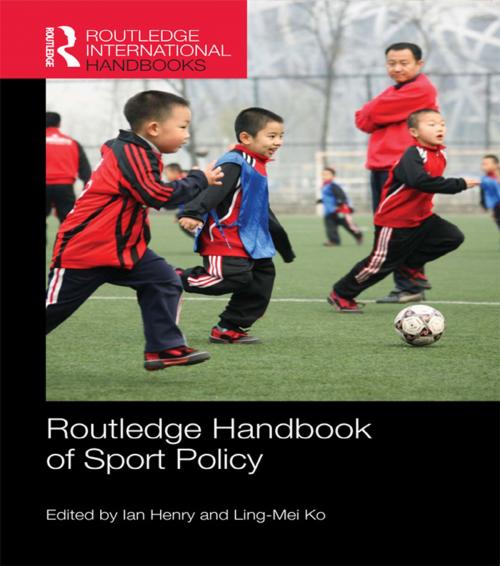Routledge Handbook of Sport Policy
Nonfiction, Sports, Reference, Social & Cultural Studies, Political Science, Government, Public Policy| Author: | ISBN: | 9781136660795 | |
| Publisher: | Taylor and Francis | Publication: | July 24, 2013 |
| Imprint: | Routledge | Language: | English |
| Author: | |
| ISBN: | 9781136660795 |
| Publisher: | Taylor and Francis |
| Publication: | July 24, 2013 |
| Imprint: | Routledge |
| Language: | English |
It is difficult to fully understand the role that sport plays in contemporary global society without understanding how and why governments, NGOs and other organizations formulate and implement policy relating to sport. The Routledge Handbook of Sport Policy is the only book to offer a comprehensive overview of current perspectives, techniques and approaches to the analysis of sport policy around the world.
The book introduces a diverse range of approaches to policy analysis across the full range of political and societal contexts, including developed and developing economies; state-centric, mixed economy and market-led systems, and both liberal democracies and political systems characterized by a dominant elite. It is arranged into five sections addressing the key topics and themes in the analysis of contemporary sport policy, including:
- theory and its implications for methodology
- globalization, governance, partnerships and networks
- elite sport policy
- development, sport and joint policy agendas
- sport policy and social theory.
With contributions from leading policy analysts around the world, including Europe, North America, the Middle East and Asia, this book is important reading for any student, researcher or professional working in sport management, sport development, sport and society, or mainstream public policy, policy analysis or social policy.
It is difficult to fully understand the role that sport plays in contemporary global society without understanding how and why governments, NGOs and other organizations formulate and implement policy relating to sport. The Routledge Handbook of Sport Policy is the only book to offer a comprehensive overview of current perspectives, techniques and approaches to the analysis of sport policy around the world.
The book introduces a diverse range of approaches to policy analysis across the full range of political and societal contexts, including developed and developing economies; state-centric, mixed economy and market-led systems, and both liberal democracies and political systems characterized by a dominant elite. It is arranged into five sections addressing the key topics and themes in the analysis of contemporary sport policy, including:
- theory and its implications for methodology
- globalization, governance, partnerships and networks
- elite sport policy
- development, sport and joint policy agendas
- sport policy and social theory.
With contributions from leading policy analysts around the world, including Europe, North America, the Middle East and Asia, this book is important reading for any student, researcher or professional working in sport management, sport development, sport and society, or mainstream public policy, policy analysis or social policy.















